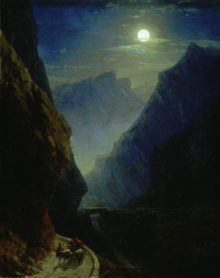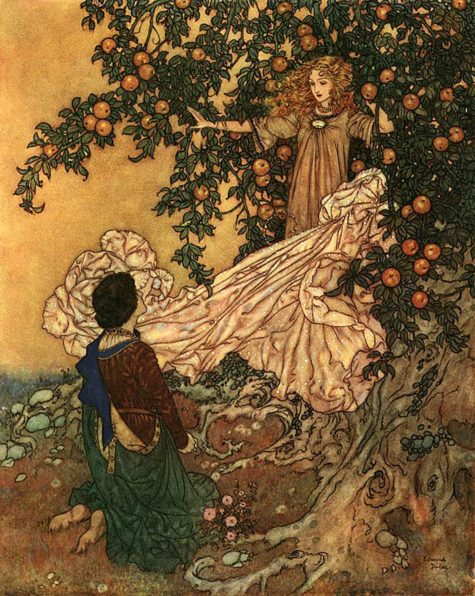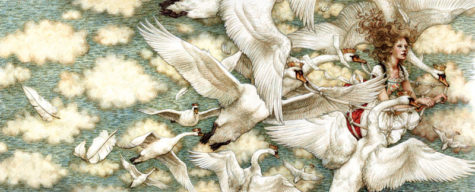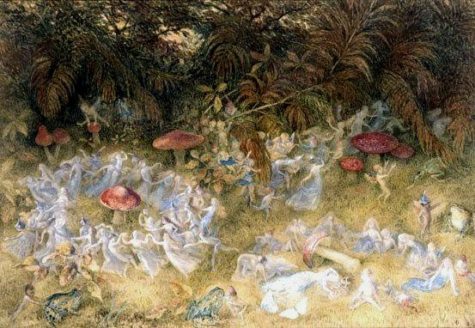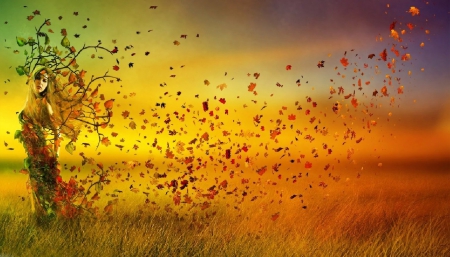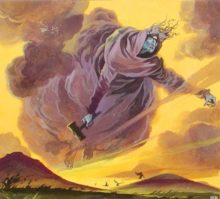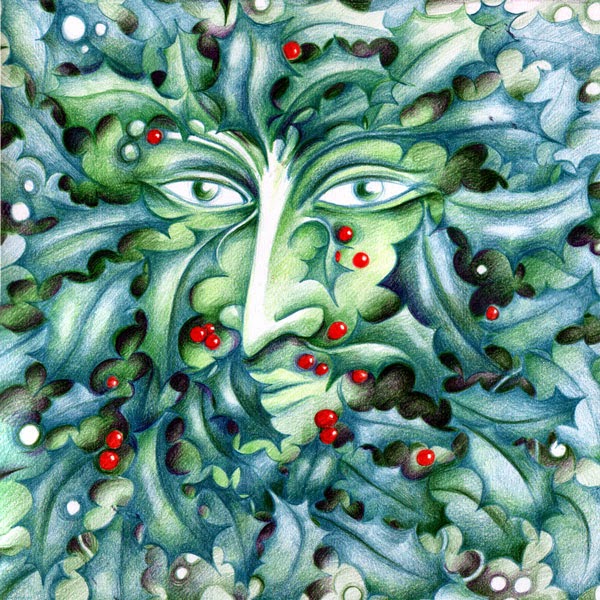shirleytwofeathers
The Legend of Nu Kua
 This story comes from China. It begins with a giant egg. The egg was filled with chaos; in fact, the egg was so huge that it was filled with absolutely everything. Darkness and light were mixed together inside the egg and everything was in so much of a muddle that nothing was anything at all. Sleeping in the middle of all this was a giant – Pan Gu.
This story comes from China. It begins with a giant egg. The egg was filled with chaos; in fact, the egg was so huge that it was filled with absolutely everything. Darkness and light were mixed together inside the egg and everything was in so much of a muddle that nothing was anything at all. Sleeping in the middle of all this was a giant – Pan Gu.
Pan Gu slept for thousands of years, but eventually he woke up and stretched himself, as he did, he broke the egg. The darkness and light separated from each other and poured out. Part of the egg drifted downwards and became the earth and part floated upwards and became the sky. The world had begun.
Pan Gu lived on the earth for many years making the world safe and beautiful. When he’d finished he was tired again and lay down for another short nap. While he slept his body changed into a whole mountain range covered in forests and rivers, his breath became the wind and his eyes became the sun and the moon. (If you’re not careful, this is what can happen to you if you stay asleep in bed for too long and don’t get up for school in the morning)
The world stayed this way for thousands of more years until, one day, it was discovered by Nu Kua. (noo-kwah)
Nu Kua was a strange and beautiful creature: her upper body was like that of a woman’s while her lower body was like that of a snake’s. She wandered around the world and was very happy. She watched the animals and roamed through the forests. Everything was so beautiful; she was enchanted with all that she saw.
The world was a wonderful place, but after a while, Nu Kua became lonely. Then, one day as she was sitting by a pool gazing at her own refection, she suddenly had an idea; she reached down into the pool and took a handful of yellow clay. Skilfully, she lovingly modeled a small figure that looked very much like her self, except that it had legs instead of a snake’s tail. When she had finished, she breathed life into it, placed it on the ground and the creature magically came to life; the first human had come into being.
Nu Kua was so delighted with the small creature, that she made many more and loved and cared for them all. At night while they slept, she would whisper secrets in their ears and sing to them softly so that they might sleep blissfully and awake in the morning with joy in their hearts.
All was well for a long time, until one day: disaster struck. In the heavens above the earth Gong Gong the lord of water and Zhu Rong the lord of fire were fighting. They fought so fiercely that they fell to earth where they continued to battle, causing terrible destruction.
What The Moon Saw
Introduction
It is a strange thing, when I feel most fervently and most deeply, my hands and my tongue seem alike tied, so that I cannot rightly describe or accurately portray the thoughts that are rising within me; and yet I am a painter; my eye tells me as much as that, and all my friends who have seen my sketches and fancies say the same.
I am a poor lad, and live in one of the narrowest of lanes; but I do not want for light, as my room is high up in the house, with an extensive prospect over the neighbouring roofs. During the first few days I went to live in the town, I felt low-spirited and solitary enough. Instead of the forest and the green hills of former days, I had here only a forest of chimney-pots to look out upon. And then I had not a single friend; not one familiar face greeted me.
So one evening I sat at the window, in a desponding mood; and presently I opened the casement and looked out. Oh, how my heart leaped up with joy! Here was a well-known face at last—a round, friendly countenance, the face of a good friend I had known at home. In, fact, it was the MOON that looked in upon me. He was quite unchanged, the dear old Moon, and had the same face exactly that he used to show when he peered down upon me through the willow trees on the moor. I kissed my hand to him over and over again, as he shone far into my little room; and he, for his part, promised me that every evening, when he came abroad, he would look in upon me for a few moments.
This promise he has faithfully kept. It is a pity that he can only stay such a short time when he comes. Whenever he appears, he tells me of one thing or another that he has seen on the previous night, or on that same evening. “Just paint the scenes I describe to you”—this is what he said to me—“and you will have a very pretty picture-book.” I have followed his injunction for many evenings. I could make up a new “Thousand and One Nights,” in my own way, out of these pictures, but the number might be too great, after all. The pictures I have here given have not been chosen at random, but follow in their proper order, just as they were described to me. Some great gifted painter, or some poet or musician, may make something more of them if he likes; what I have given here are only hasty sketches, hurriedly put upon the paper, with some of my own thoughts, interspersed; for the Moon did not come to me every evening— a cloud sometimes hid his face from me.
First Evening
Last night”—I am quoting the Moon’s own words—“last night I was gliding through the cloudless Indian sky. My face was mirrored in the waters of the Ganges, and my beams strove to pierce through the thick intertwining boughs of the bananas, arching beneath me like the tortoise’s shell. Forth from the thicket tripped a Hindoo maid, light as a gazelle, beautiful as Eve. Airy and etherial as a vision, and yet sharply defined amid the surrounding shadows, stood this daughter of Hindostan: I could read on her delicate brow the thought that had brought her hither. The thorny creeping plants tore her sandals, but for all that she came rapidly forward. The deer that had come down to the river to quench her thirst, sprang by with a startled bound, for in her hand the maiden bore a lighted lamp. I could see the blood in her delicate finger tips, as she spread them for a screen before the dancing flame.
The Garden of Paradise
There was once a king’s son who had a larger and more beautiful collection of books than any one else in the world, and full of splendid copper-plate engravings. He could read and obtain information respecting every people of every land; but not a word could he find to explain the situation of the garden of paradise, and this was just what he most wished to know.
His grandmother had told him when he was quite a little boy, just old enough to go to school, that each flower in the garden of paradise was a sweet cake, that the pistils were full of rich wine, that on one flower history was written, on another geography or tables; so those who wished to learn their lessons had only to eat some of the cakes, and the more they ate, the more history, geography, or tables they knew. He believed it all then; but as he grew older, and learnt more and more, he became wise enough to understand that the splendor of the garden of paradise must be very different to all this. “Oh, why did Eve pluck the fruit from the tree of knowledge? why did Adam eat the forbidden fruit?” thought the king’s son: “if I had been there it would never have happened, and there would have been no sin in the world.” The garden of paradise occupied all his thoughts till he reached his seventeenth year.
One day he was walking alone in the wood, which was his greatest pleasure, when evening came on. The clouds gathered, and the rain poured down as if the sky had been a waterspout; and it was as dark as the bottom of a well at midnight; sometimes he slipped over the smooth grass, or fell over stones that projected out of the rocky ground. Every thing was dripping with moisture, and the poor prince had not a dry thread about him. He was obliged at last to climb over great blocks of stone, with water spurting from the thick moss. He began to feel quite faint, when he heard a most singular rushing noise, and saw before him a large cave, from which came a blaze of light. In the middle of the cave an immense fire was burning, and a noble stag, with its branching horns, was placed on a spit between the trunks of two pine-trees. It was turning slowly before the fire, and an elderly woman, as large and strong as if she had been a man in disguise, sat by, throwing one piece of wood after another into the flames.
“Come in,” she said to the prince; “sit down by the fire and dry yourself.”
“There is a great draught here,” said the prince, as he seated himself on the ground.
“It will be worse when my sons come home,” replied the woman; “you are now in the cavern of the Winds, and my sons are the four Winds of heaven: can you understand that?”
“Where are your sons?” asked the prince.
“It is difficult to answer stupid questions,” said the woman. “My sons have plenty of business on hand; they are playing at shuttlecock with the clouds up yonder in the king’s hall,” and she pointed upwards.
“Oh, indeed,” said the prince; “but you speak more roughly and harshly and are not so gentle as the women I am used to.”
“Yes, that is because they have nothing else to do; but I am obliged to be harsh, to keep my boys in order, and I can do it, although they are so head-strong. Do you see those four sacks hanging on the wall? Well, they are just as much afraid of those sacks, as you used to be of the rat behind the looking-glass. I can bend the boys together, and put them in the sacks without any resistance on their parts, I can tell you. There they stay, and dare not attempt to come out until I allow them to do so. And here comes one of them.”
Twelve Wild Swans
Far away in the land to which the swallows fly when it is winter, dwelt a king who had eleven sons, and one daughter, named Eliza. The eleven brothers were princes, and each went to school with a star on his breast, and a sword by his side. They wrote with diamond pencils on gold slates, and learnt their lessons so quickly and read so easily that every one might know they were princes. Their sister Eliza sat on a little stool of plate-glass, and had a book full of pictures, which had cost as much as half a kingdom. Oh, these children were indeed happy, but it was not to remain so always.
Their father, who was king of the country, married a very wicked queen, who did not love the poor children at all. They knew this from the very first day after the wedding. In the palace there were great festivities, and the children played at receiving company; but instead of having, as usual, all the cakes and apples that were left, she gave them some sand in a tea-cup, and told them to pretend it was cake. The week after, she sent little Eliza into the country to a peasant and his wife, and then she told the king so many untrue things about the young princes, that he gave himself no more trouble respecting them.
“Go out into the world and get your own living,” said the queen. “Fly like great birds, who have no voice.” But she could not make them ugly as she wished, for they were turned into eleven beautiful wild swans. Then, with a strange cry, they flew through the windows of the palace, over the park, to the forest beyond. It was early morning when they passed the peasant’s cottage, where their sister Eliza lay asleep in her room. They hovered over the roof, twisted their long necks and flapped their wings, but no one heard them or saw them, so they were at last obliged to fly away, high up in the clouds; and over the wide world they flew till they came to a thick, dark wood, which stretched far away to the seashore.
Trick or Treat!
Here we have a compilation of the longest list of folkloric supernatural creatures, and a great Halloween quote:
“What a happiness this must have been seventy or eighty years ago and upwards, to those chosen few who had the good luck to be born on the eve of this festival of all festivals; when the whole earth was so overrun with ghosts, boggles, bloody-bones, spirits, demons, ignis fatui, brownies, bugbears, black dogs, specters, shellycoats, scarecrows, witches, wizards, barguests, Robin-Goodfellows, hags, night-bats, scrags, breaknecks, fantasms, hobgoblins, hobhoulards, boggy-boes, dobbies, hob-thrusts, fetches, kelpies, warlocks, mock-beggars, mum-pokers, Jemmy-burties, urchins, satyrs, pans, fauns, sirens, tritons, centaurs, calcars, nymphs, imps, incubuses, spoorns, men-in-the-oak, hell-wains, fire-drakes, kit-a-can-sticks, Tom-tumblers, melch-dicks, larrs, kitty-witches, hobby-lanthorns, Dick-a-Tuesdays, Elf-fires, Gyl-burnt-tales, knockers, elves, rawheads, Meg-with-the-wads, old-shocks, ouphs, pad-foots, pixies, pictrees, giants, dwarfs, Tom-pokers, tutgots, snapdragons, sprets, spunks, conjurers, thurses, spurns, tantarrabobs, swaithes, tints, tod-lowries, Jack-in-the-Wads, mormos, changelings, redcaps, yeth-hounds, colt-pixies, Tom-thumbs, black-bugs, boggarts, scar-bugs, shag-foals, hodge-pochers, hob-thrushes, bugs, bull-beggars, bygorns, bolls, caddies, bomen, brags, wraiths, waffs, flay-boggarts, fiends, gallytrots, imps, gytrashes, patches, hob-and-lanthorns, gringes, boguests, bonelesses, Peg-powlers, pucks, fays, kidnappers, gallybeggars, hudskins, nickers, madcaps, trolls, robinets, friars’ lanthorns, silkies, cauld-lads, death-hearses, goblins, hob-headlesses, bugaboos, kows, or cowes, nickies, nacks necks, waiths, miffies, buckies, ghouls, sylphs, guests, swarths, freiths, freits, gy-carlins Gyre-carling, pigmies, chittifaces, nixies, Jinny-burnt-tails, dudmen, hell-hounds, dopple-gangers, boggleboes, bogies, redmen, portunes, grants, hobbits, hobgoblins, brown-men, cowies, dunnies, wirrikows, alholdes, mannikins, follets, korreds, lubberkins, cluricauns, kobolds, leprechauns, kors, mares, korreds, puckles korigans, sylvans, succubuses, blackmen, shadows, banshees, lian-hanshees, clabbernappers, Gabriel-hounds, mawkins, doubles, corpse lights or candles, scrats, mahounds, trows, gnomes, sprites, fates, fiends, sibyls, nicknevins, whitewomen, fairies, thrummy-caps, cutties, and nisses, and apparitions of every shape, make, form, fashion, kind and description, that there was not a village in England that had not its own peculiar ghost.
Nay, every lone tenement, castle, or mansion-house, which could boast of any antiquity had its bogle, its specter, or its knocker. The churches, churchyards, and crossroads were all haunted. Every green lane had its boulder-stone on which an apparition kept watch at night. Every common had its circle of fairies belonging to it. And there was scarcely a shepherd to be met with who had not seen a spirit!”
~Found in the writings of Michael Aislabie Denham (1859)
Lady Autumn
Lady Autumn, Queen of the Harvest,
I have seen You in the setting Sun
with Your long auburn tresses
blowing in the cool air that surrounds You.
Your crown of golden leaves is jeweled
with amber, amethyst, and rubies.
Your long, flowing purple robe stretches across the horizon.
In Your hands You hold the ripened fruits.
At Your feet the squirrels gather acorns.
Black crows perch on Your outstretched arms.
All around You the leaves are falling.
You sit upon Your throne and watch
the dying fires of the setting Sun
shine forth its final colors in the sky.
The purple and orange lingers
and glows like burning embers.
Then all colors fade into the twilight.
Lady Autumn, You are here at last.
We thank You for Your rewards.
We have worked hard for these gifts.
Lady Autumn, now grant us peace and rest.
~by Deirdre Akins
A Song of Cailleach
“Bha da shleagha chaola chatha
air an taobh eile dh’an chaillich
Bha ‘h-aodann dubh-ghorm air dreach a ‘ghuail
‘S a deud cnabadach cnamh-ruadh.
Bha aon suil ghlumach ‘na ceann
Bu luaithe na rionnag gheamhraidh;
Craobh mhineach chas air a ceann
Mar choill inich de ‘n t-seana chrithinn.
Translation:
There were two slender spears of battle
upon the other side of the carlin
her face was blue-black, of the lustre of coal,
And her bone tufted tooth was like rusted bone.
In her head was one deep pool-like eye
Swifter than a star in winter
Upon her head gnarled brushwood
like the clawed old wood of the aspen root.
From:
Popular Tales of the West Highlands – Vol 3
Related content:
The Powers That Be – The Old Woman Cailleach
James Cheney: Invocation To The Dark Mother
Daniel: Prayer Before The Final Battle
blessed obyno: Queen of Ghosts
blessed obyno: Queen of Ghosts
Caerlion Arthur: The Great, Bloody and Bruised Veil of the World
